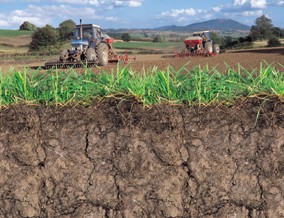
Soil Series Horizon Properties
HORIZON Hydraulics
Soil Series Horizon Hydraulic Data

HORIZON Hydraulics is tabular data that can be used in conjunction with any of the NATMAP products, excepting NATMAP soilscapes.
HORIZON Hydraulics includes very detailed descriptions of the hydraulic properties pertaining to each layer, or horizon for each of the soils. This data is based heavily on laboratory based analyses.
Version 2.0 released in November 2014 corrects some anomalies and minimises the larger predictive errors. A new set of predictive equations was derived using an expanded set of measured data from England, Wales, Scotland and Northern Ireland (Hollis et al., 2014). The methodology used to derive the equations has resolved the former problems with respect to poor prediction of water retention in soils with relatively ‘extreme’ mineral particle-size distributions. It has also substantially reduced problems relating to anomalies, between predicted values at increasing pressure heads. Any such remaining anomalies have been eliminated from the dataset. A paper has recently been published which describes the new predictive equations.
Hollis, J. M., Lilly, A., Higgins, A., Jones, R. J. A. Keay, C. A. and Bellamy, P.H. (2014). Predicting the water retention characteristics of UK mineral soils. European Journal of Soil Science, 2014, doi: 10.1111/ejss.12186Find out more about the updates here
How much does this product cost?
You will need to lease this attribute product with a relevant NATMAP soil map dataset. For detailed pricing information, use our Quotation Advisor utility.
HORIZON Hydraulics data and description
The table below describes the various properties within this data product. Each table contains the information outlined below.
| Property | Example from data | Description |
|---|---|---|
| HORID | 1 | Unique Horizon Identifier (Defines one Horizon (depth range, series, landuse)) |
| SERIES | 17 | Soil series code for each series, this is a 4 digit numeric code |
| SERIES_NAME | ANGLEZARKE | Soil series name |
| LU_GROUP | PG | Landuse Group - AR (Arable) PG (Permanent Grass) LE (Ley Grassland) or OT (Other) |
| DESIGNATION | E | Layer Designation - At a basic level A (Topsoil) B (subsoil) C (Parent Material) E (Elluvial) O (Organic) |
| UPPER_DEPTH | 20 | Horizon upper depth in cm (<0 indicated litter layer) |
| LOWER_DEPTH | 35 | Horizon lower depth in cm (999 implies the depth was below bottom of the profile) |
| BULK_DENSITY | 1.29 | Bulk density of fine earth (g/cm3) |
| PARTICLE_DENSITY | 2.63 | Calculated particle density (g/cm3) |
| TOTAL_POROSITY | 51.1 | Total pore space (%) volume - Shardlow data |
| THV0 | 28.7 | Water content at saturation (% vol) |
| THV1 | 26.6 | Empirical water content at -1 kPa tension (% vol) |
| THV5 | 18.3 | Volumetric water content (%) at 5 kPa tension (field capacity) |
| THV10 | 15.8 | Volumetric water content (%) at 10 kPa suction (equated with field capacity in sandy soils |
| THV40 | 11.2 | Volumetric water content (%) at 40 kPa suction |
| THV200 | 7.7 | Volumetric water content (%) at 200 kPa suction |
| THV1500 | 5.1 | Volumetric water content (%) at 1500 kPa suction (wilting point) |
| KSAT_SUBVERT | 653.9 | Saturated hydraulic conductivity (sub-vertical) cm/day |
| KSAT_LAT | 653.9 | Saturated hydraulic conductivity (lateral) cm/day |
| VG_TH_S | 0.3 | Van Genuchten's water content at quasi-saturation (w/w) |
| VG_TH_R | 0.0285 | Van Genuchten's residual water content (w/w) |
| VG_ALPHA | 0.1326 | Van Genuchtens 'alpha' parameter |
| VG_N | 1.5385 | Van Genuchtens 'n' parameter |
| VG_M | 0.35 | Van Genuchtens 'm' parameter |
| BC_TH_S | 0.387 | Brook’s Corey water content at saturation (vol fraction) |
| BC_ALPHA | 37.6581 | Brook’s Corey 'alpha' parameter |
| BC_BETA | 3.3264 | Brook’s Corey 'beta' parameter |
Note: Quality information (*_QA) relevant to the texture, organic carbon and pH values is provided. Where the data is averaged from measured sample data the standard deviation is recorded unless their were too few samples in which case Not Applicable (NA) is entered. In some cases an expert soil scientist provided a meaningful value for the parameter in which case the value is labeled 'EXPERT'. Where no meaningful value is derivable a reason is given whether as a result of rock, rubble, ironpan or peat. The coarse and medium sand values have as yet only been derived for the 'A' horizons, therefore subhorizons are labeled 'ND' for Not Derived.
